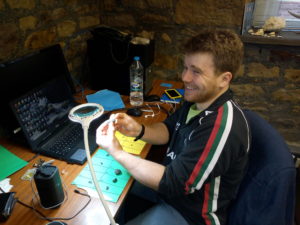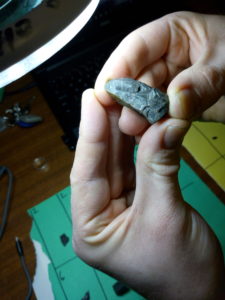Collaboration between Oxford Archaeology and The University of Central Lancashire
October 2016 until October 2020
Stones of Contention is a PhD research project funded by the collaborative doctoral awards through the AHRC training grant scheme, and supervised by senior staff at both Oxford Archaeology North (OAN) and the University of Central Lancashire (UCLan). Its focus is on understanding lithic technology within the region over the crucial Mesolithic/Neolithic transition, the course of which is hotly contested. Collaboration was motivated by the desire by both OAN and UCLan to maximise the information gained during commercially funded excavations undertaken by OAN in advance of the Carlisle Northern Development Route, specifically through the analysis of lithics from the exceptionally well-preserved Stainton West site. Information sharing during the project led to the decision to create a partnership to support further research by optimising expertise, both academic and technical. The programme was also designed to provide professional career development for the individual selected, as well as developing a programme of public dissemination of the research.
Research outcomes have comprised an enhanced understanding of the use of different tools and stone sources over the period transition, one that is better informed by a Mesolithic perspective than had been possible before. The study also indicated subtle changes at the end of the Mesolithic period. Public engagement has included sessions with members of the Blackburn Youth Zone, inspiring them to make their own stone tools and lithics, and empowering them to teach others. Another element has been to develop KS2 sessions, targeting the science behind stone tool and lithic manufacture. ‘Crash and Bang! Sounds, Stones and Toolmaking’ involved a short talk about the science behind the forces and sound created while making stone tools. It had kids within the school groups participating in hands on activities, smashing up three different types of sweets to see how they fractured as a proxy for different types of stones, and how their different properties could affect making stone tools and lithics in prehistory.
It is the intention to develop these sessions further into a set of Archaeological Science related curriculum sessions that can be delivered to schools regularly within the North West as part of both organisations’ public engagement goals; games relating to the Identification of Stone tools and Lithics have already been developed.
This collaboration has enabled two organisations working in different sectors of archaeological research to co-operate, strengthen ties, innovate and further an understanding of the past. On an individual level it has enabled the PhD candidate to utilise expertise within the development-led sector as well as within academia which has been invaluable in providing comprehensive and well-rounded research. Having now submitted his PhD, Rob Leedham is working in a professional capacity on the new OAN excavations in advance of road construction in the WYRE Estuary. The relationship has enabled the UCLan summer schools which had been cancelled due to COVID-19, to be relocated to this project.
The UK Research and Innovation website will be updated with the outcomes of this research after the completion of the project. Find the website here.


Bringing together senior members of staff from public and non-government bodies to work collaboratively on strategic matters for the historic environment sector.